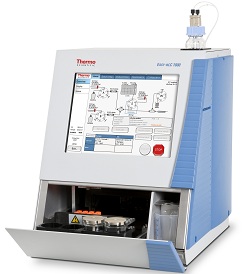ANY INSTRUMENT that delivers a 34% improvement in laboratory productivity is one that lab managers have to take seriously. Thermo says that researchers at the Centre for Experimental Bioinformatics (CEBI) at the University of Southern Denmark have seen a 34% increase in peptide identifications, and a 22% increase in protein identifications, since implementing its Easy-nLC 1000 nano-ultra high performance liquid chromatography (UHPLC) system.
CEBI had previously used conventional HPLC, but wanted to accelerate productivity and improve efficiency in proteomics research including the study of complex dendritic mouse cells.
The Easy-nLC 1000 enables separation of biomolecules at ultra-high pressures, which has increased the number of peptide and protein identifications that are performed. The instrument also allows selection of column dimensions and solid phase materials to identify the most suitable configuration for a specific analytical requirement. Thinner, longer columns and smaller beads improve separation and ionisation, for example, enhancing sensitivity and allowing the researchers to scale down experiments and so reduce costs.
“The EASY-nLC 1000 is a highly robust instrument offering nano-UHPLC performance dedicated to proteomics scientists,” said Lasse Falkenby, research assistant at CEBI. “We decided to implement it in our laboratory as we felt it would revolutionise the way we perform LC-MS analyses. The instrument has allowed our laboratory to increase productivity considerably in a way that would never have been possible before. Implementation was a very smooth process requiring minimal configuration effort”.
Based in Odense, the University of Southern Denmark’s department of biochemistry and molecular biology has a world-class reputation in proteomics, with research focusing on gene structure and organisation, regulation and RNA translation.

